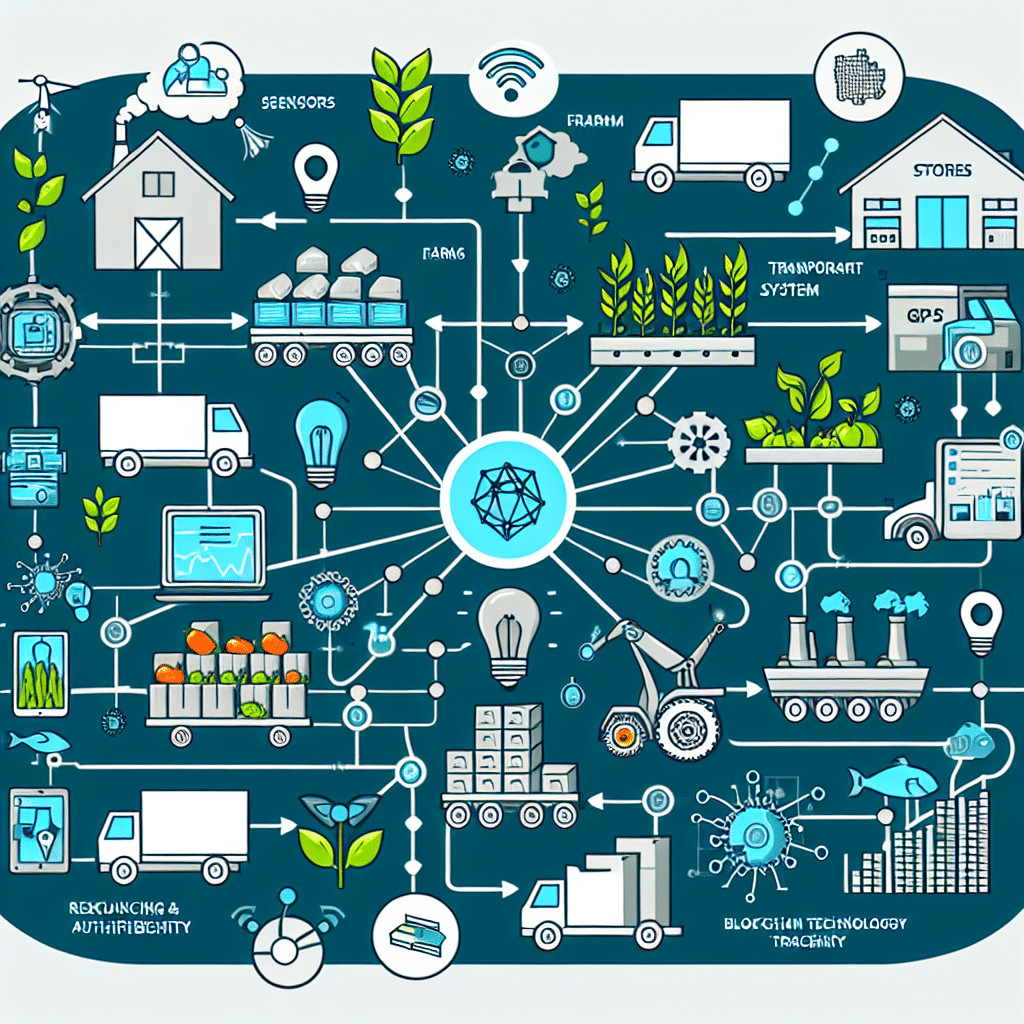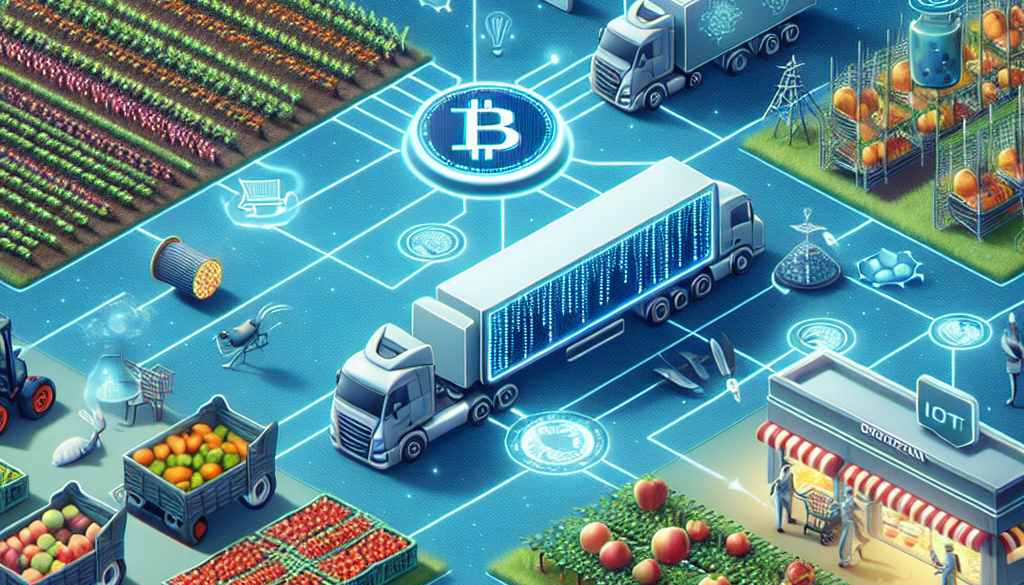Enhancing Food Supply Chain With IoT And Blockchain.
-
Table of Contents
- Revolutionizing the Food Supply Chain: IoT and Blockchain Integration
- The Role of IoT in the Food Supply Chain
- Blockchain’s Impact on Food Supply Chain Transparency
- Combining IoT with Blockchain for a Synergistic Effect
- Case Studies: IoT and Blockchain in Action
- Conclusion: The Future of Food Supply Chain with IoT and Blockchain
- ETprotein: Enhancing Nutrition with High-Quality Protein Products
Revolutionizing the Food Supply Chain: IoT and Blockchain Integration

The global food supply chain is a complex network that involves numerous stakeholders, including farmers, processors, distributors, retailers, and consumers. Ensuring the efficiency, transparency, and safety of this chain is paramount for the health of the population and the sustainability of food production. With the advent of the Internet of Things (IoT) and blockchain technology, the food industry is on the brink of a significant transformation. This article explores how these technologies can enhance the food supply chain, providing valuable insights and statistics to support the integration of IoT and blockchain.
The Role of IoT in the Food Supply Chain
IoT technology involves the use of internet-connected devices that can collect, transmit, and analyze data. In the context of the food supply chain, IoT can offer numerous benefits:
- Real-time tracking: IoT devices can monitor the location and condition of food products as they move from farm to table. This ensures that perishable items are transported efficiently and within safe conditions.
- Quality control: Sensors can measure temperature, humidity, and other environmental factors that affect food quality, allowing for immediate corrective actions if necessary.
- Inventory management: Automated systems can track stock levels, reducing waste and ensuring that supply meets demand.
- Predictive maintenance: IoT can predict when machinery or vehicles need maintenance before they break down, avoiding disruptions in the supply chain.
According to a report by MarketsandMarkets, the IoT in agriculture market size is expected to grow from USD 12.7 billion in 2019 to USD 20.9 billion by 2024, at a Compound Annual Growth Rate (CAGR) of 10.4% during the forecast period. This growth is indicative of the potential IoT has to revolutionize the food supply chain.
Blockchain’s Impact on Food Supply Chain Transparency
Blockchain technology offers a decentralized ledger that can record transactions securely and immutably. In the food supply chain, blockchain can be used to:
- Enhance traceability: Each transaction or movement of a food product can be recorded on the blockchain, providing a transparent and tamper-proof trail from origin to consumer.
- Improve food safety: In the event of a food safety issue, blockchain can quickly identify the source and scope of contamination, leading to faster recalls and less consumer risk.
- Reduce fraud: The authenticity of food products, such as organic or fair-trade items, can be verified through blockchain, reducing the risk of counterfeit goods.
- Streamline transactions: Smart contracts on the blockchain can automate payments and other transactions, reducing paperwork and speeding up processes.
As per a report by BIS Research, the global blockchain in agriculture and food supply chain market is projected to reach $1.4 billion by 2028, growing at a CAGR of 48.1% from 2018 to 2028. This significant growth reflects the increasing demand for transparency and trust in the food industry.
Combining IoT with Blockchain for a Synergistic Effect
While IoT and blockchain offer individual benefits to the food supply chain, their combination can lead to a synergistic effect that amplifies these advantages:
- Enhanced data integrity: IoT devices can feed data directly into a blockchain, ensuring that the information is accurate and unaltered.
- Automated compliance: IoT can monitor compliance with regulations, and blockchain can provide an immutable record, simplifying audits and regulatory checks.
- Greater consumer confidence: Consumers can access the blockchain to verify the journey and handling of their food, leading to increased trust in brands and products.
Integrating IoT with blockchain in the food supply chain is not without its challenges, such as the need for standardization and concerns over data privacy. However, the potential benefits are driving innovation and investment in this area.
Case Studies: IoT and Blockchain in Action
Several companies and organizations have already begun implementing IoT and blockchain technologies in their supply chains. For instance:
- Walmart: The retail giant has partnered with IBM to use blockchain to trace the origin of food products, significantly reducing the time it takes to track produce from six days to just two seconds.
- Carrefour: This French multinational retailer uses blockchain to provide customers with detailed information on products such as chicken, eggs, and tomatoes, including origin, date of harvest, and packaging date.
These examples demonstrate the practical applications and benefits of IoT and blockchain in enhancing food supply chain operations.
Conclusion: The Future of Food Supply Chain with IoT and Blockchain
The integration of IoT and blockchain technologies holds the promise of a more efficient, transparent, and safe food supply chain. By leveraging real-time data, enhancing traceability, and automating transactions, stakeholders can address many of the current challenges facing the industry. As adoption grows and these technologies continue to evolve, we can expect to see significant improvements in how we produce, distribute, and consume food.
ETprotein: Enhancing Nutrition with High-Quality Protein Products
In line with the advancements in the food supply chain, ETprotein company is at the forefront of providing high-quality protein products that cater to the evolving needs of consumers. Their extensive range of organic bulk vegan proteins and L-(+)-Ergothioneine (EGT) products are produced with the highest standards, ensuring that consumers receive nutritious and safe ingredients for their dietary needs.
ETprotein’s commitment to non-GMO, allergen-free, and high-purity products aligns with the demand for transparency and quality in the food industry. By choosing ETprotein, consumers and manufacturers can be confident in the integrity and nutritional value of their protein sources.
About ETprotein:
ETprotein, a reputable protein and L-(+)-Ergothioneine (EGT) Chinese factory manufacturer and supplier, is renowned for producing, stocking, exporting, and delivering the highest quality organic bulk vegan proteins and L-(+)-Ergothioneine. They include Organic rice protein, clear rice protein, pea protein, clear pea protein, watermelon seed protein, pumpkin seed protein, sunflower seed protein, mung bean protein, peanut protein, and L-(+)-Ergothioneine EGT Pharmaceutical grade, L-(+)-Ergothioneine EGT food grade, L-(+)-Ergothioneine EGT cosmetic grade, L-(+)-Ergothioneine EGT reference grade and L-(+)-Ergothioneine EGT standard. Their offerings, characterized by a neutral taste, non-GMO, allergen-free attributes, with L-(+)-Ergothioneine purity over 98%, 99%, cater to a diverse range of industries. They serve nutraceutical, pharmaceutical, cosmeceutical, veterinary, as well as food and beverage finished product distributors, traders, and manufacturers across Europe, USA, Canada, Australia, Thailand, Japan, Korea, Brazil, and Chile, among others.
ETprotein specialization includes exporting and delivering tailor-made protein powder and finished nutritional supplements. Their extensive product range covers sectors like Food and Beverage, Sports Nutrition, Weight Management, Dietary Supplements, Health and Wellness Products, and Infant Formula, ensuring comprehensive solutions to meet all your protein needs.
As a trusted company by leading global food and beverage brands and Fortune 500 companies, ETprotein reinforces China’s reputation in the global arena. For more information or to sample their products, please contact them and email sales(at)ETprotein.com today.












